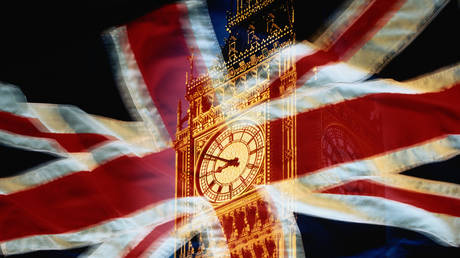
UK warned of toughest fiscal choices in decades
The next British government will inherit a slew of economic problems, and will have to quickly decide how to tackle them, according to a think tank
The UK economy is in a tight spot and the new government which will come to power after the general elections scheduled for July will face the hardest fiscal challenge the country has seen in decades, the Institute for Fiscal Studies (IFS) think tank indicated in a report on Saturday.
According to the analysts, the new administration will inherit three key problems: a debt burden close to 100% of gross domestic product (GDP), high interest rates and low growth. The government, they claim, has “limited headroom” for dealing with these challenges, and will have to decide quickly between several unappealing options.
One option researchers singled out is to implement spending cuts. However, they say this option “will inevitably be painful,” as public services, the Home Office, justice, and local government are already struggling due to scarce funding. Another option is to further raise taxes, but this would also be difficult, given that at their current pace they are already due to hit an 80-year high by 2028-29.
Read more
UK PM Sunak calls snap general election
“The fact that this is only just enough to stabilize debt in five years’ time speaks to the difficulty of the economic and fiscal inheritance awaiting the next government,” the IFS stated.
A third option to deal with fiscal challenges would be to borrow more, but this step would further increase the UK’s debt burden, which both the ruling Conservative party and the Labour opposition have pledged to stabilize.
According to analysts, things could be easier if the UK’s nominal GDP started to grow quickly, due to either high inflation or rapid ‘real’ economic growth. However, according to the latest forecasts, the next British government will face lower than average nominal GDP growth of 3.6% per year coupled with higher than average debt interest spending, which, the IFS said, is not a promising combination.
READ MORE: UK slips into recession
According to IFS Director Paul Johnson, who commented on his agency’s findings in an interview with Bloomberg, the UK could hope for GDP growth to pick up and thus avoid making the tough choices outlined in the report. However, the prospect is unlikely.
“Money is tight. Public services are creaking, taxes are at historically high levels, and both parties are hemmed in by their very clear pledges to get debt falling… We could get miraculously lucky with growth and escape having to make these tough choices. But we might not. Just because thousands of English and Scottish football fans are crossing their fingers and hoping for the best this summer doesn’t mean that the next Cabinet should do the same,” Johnson stated.

